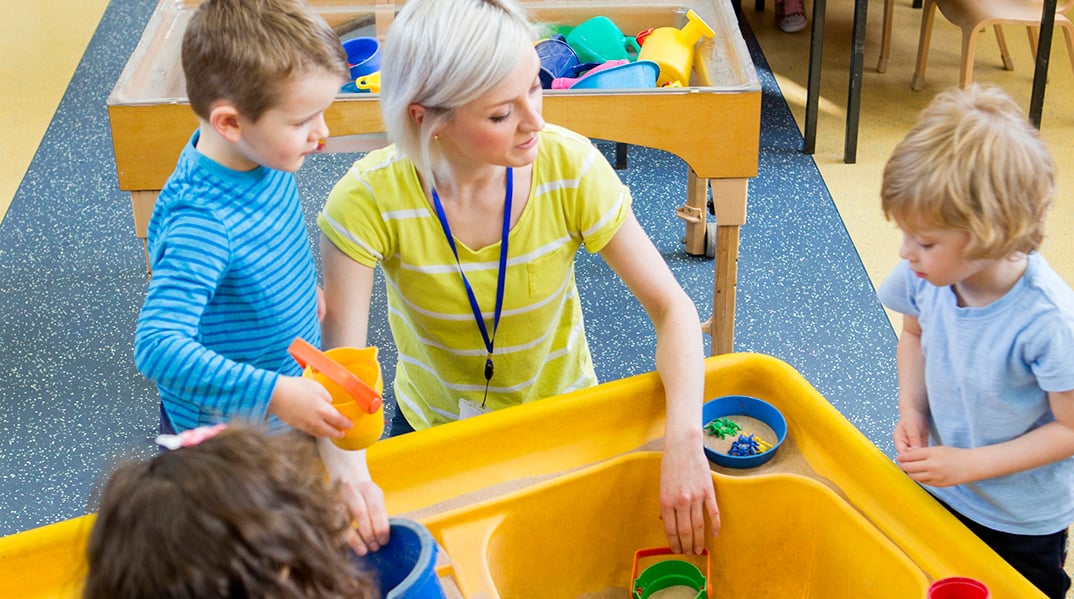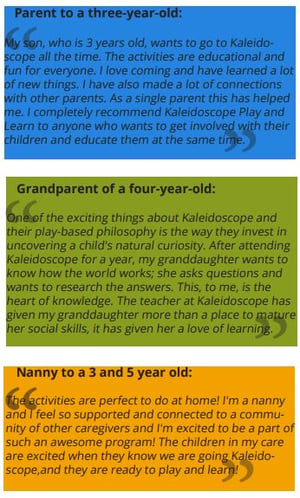
Child Care Resource Center (CCRC), serves California’s Northern Los Angeles and San Bernardino counties. A few years ago, the agency was searching for an innovative way to provide parents, license-exempt providers, and family, friend and neighbor caregivers with early childhood support, information, and resources. CCRC also wanted a program that would strengthen their relationship with the community, while helping caregivers and families connect with each other. The goal was to promote the optimal development of the children within these often underserved caregiver settings.
The agency found Kaleidoscope Play & Learn, a program that offers community-based support to caregivers. Its philosophy is that quality early childhood experiences make children better prepared for success in school and life. CCRC has been implementing the program since January 2015. Kaleidoscope Play & Learn is an evidence-informed practice that takes a whole-child, whole-family, and whole-community approach. The program supports caregivers in promoting the early growth and development of children, in the context of their own communities and languages. The guiding principles of the program are:
- Community Collaboration
- Trusting, Responsive Partnerships
- Respectful Relationships
- Supportive Community
Want a printable version of this post?
How the Program Works
Each 90-minute Kaleidoscope Play & Learn group is facilitated by trained staff and includes:
- Child-Directed Play: Children and caregivers participate in open-ended, child-directed play, They choose from a variety of play centers that support different areas of development.
- Coordinated Group Activity: Children and caregivers participate in an activity such as reading or other pre-literacy activities, singing, dancing/ movement, art or nutrition education.
- Intentional Caregiver Learning: The facilitator shares with the caregiver how and what the children are learning from an activity or through play. The facilitator will also offer suggestions on what caregivers can do at home to provide intentional learning. The information can be provided verbally (through casual conversation) or in writing (posters, handouts, etc.).
- Intentional Efforts to Help Caregivers Build Supportive Relationships: The facilitator structures the group so that caregivers can interact with one another. The facilitator also intentionally tries to connect participants to help them build mutually supportive relationships.
- Opportunities for Children to Interact with Each Other: Children can interact with one another by playing together in small or large groups.
- Intentional Opportunities for Caregiver Leadership: The facilitator provides opportunities for caregivers to run or help run the group. This allows caregivers to develop and practice leadership skills.
Success by the Numbers
The California Child Care Resource & Referral Network supports the program in CCR&R agencies throughout the state. According to a 2016 Kaleidoscope Play and Learn Evaluation Fact Sheet produced by the network some significant outcomes of the program include:
- 80 percent of caregivers reported positive increases in each of the 14 outcome indicators
- 90 percent of respondents feel more supported as a parent or caregiver in their community
- 86 percent talk more with their child about numbers, shapes and sizes
- Many report they have learned a lot about child development, health & safety and nutrition
- Parents have said that they enjoy the activities and are excited about implementing them at home.
- Input from regular participants indicates that they have become very comfortable with the groups. Many are now stepping up to lead or help lead their groups.
In Their Own Words
CCRC's Kaleidoscope Play & Learn program is making strides to ensure more children in the CCRC’s service area have access to safe, nurturing environments offering high-quality care.
Learn More
Child Care Resource Center
Judi Ruiz
Family Engagement Supervisor
jruiz@ccrcca.org
View the 2016 Kaleidoscope Play and Learn Evaluation Fact Sheet
The Promising Practices Spotlights illuminate some of the successful ways early childhood programs around the nation are connecting with families and communities through high-quality engagement initiatives.







